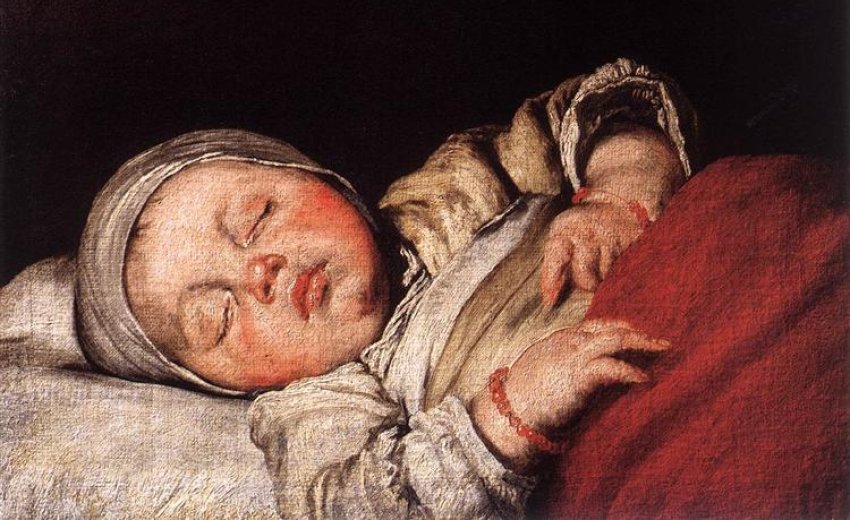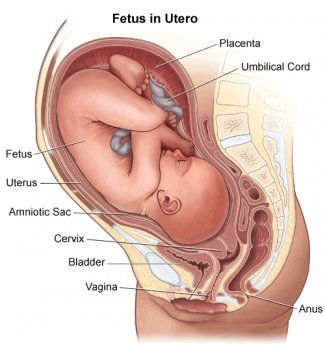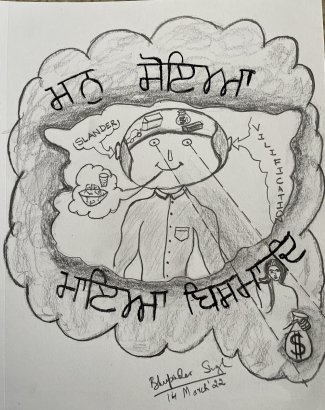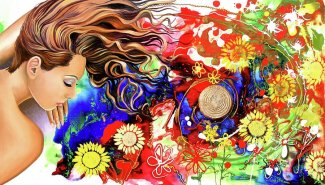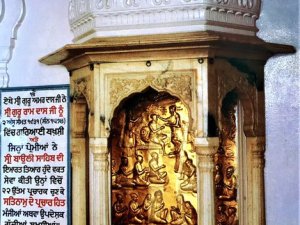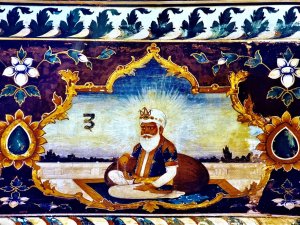Introduction
Seventies is a significant milestone of life, which only the select few get to experience. It is like the opening of a new life vista, when we start experiencing aches, suffering, debilitation, deterioration, and issues with the normal functioning of body parts, previously taken for granted. What had been taken for granted in the past, now starts showing signs of aging, wear, tear etc. affecting gait, ability, and agility. The macho youth feel like old history, along with the feeling I can do it all by myself. Now the feeling of being reduced in scale is very real. The altered life reality suddenly imparts a new depth and meaning to Gurbani on the subject of different stages of life cycle. From that threshold, looking back on the progression of life’s journey brings to mind the very first stage of life – in the womb. When we explore Gurbani it makes us realize that Guru Ji has talked about the state of mind in the womb. Yet when exploring the existing scientific, psychological, and medical literature on the state of mind in the womb before the birth we encounter a complete silence. In fact, nothing exists that details the mind’s working in the mother's womb. As we cannot find any literature, writings, discussions or talks on the subject of mind in the womb, let us explore it from the Gurbani insights.
What Engaged the Mind in the Womb
When exploring Gurbani on the subject of the mind’s working in the womb we find amazing details. In fact, it startles us that we had not heard it before although it existed. In fact, on occasions, we may have heard about them earlier, but they did not pierce our inside before, but now offered a plethora of relatable insights. Suddenly, those words have an awe factor added to them. As whatever is written in SGGS either by Gurus themselves or by Bhagats shares their unique perspectives through their own authentic experiences. Those observations, well beyond the reach of the normal mind, can only be termed as beyond the realm of the five senses and the mind. These words have only been shared with us out of their compassion for our spiritual upliftment alone. Their words are fearless, not driven by motives of greed, power, authority, wealth, or fame etc. The experiences that have been shared are not shackled by any social norms, nor molded through conditioning of the parents, schools, colleges, universities, society including the friend’s circle and the media.
So, let us explore the pre-birth stage from Gurbani perspective along with the portrait it paints of our lives:
“ਰਚੰਤਿ ਜੀਅ ਰਚਨਾ ਮਾਤ ਗਰਭ ਅਸਥਾਪਨੰ ॥ ਸਾਸਿ ਸਾਸਿ ਸਿਮਰੰਤਿ ਨਾਨਕ ਮਹਾ ਅਗਨਿ ਨ ਬਿਨਾਸਨੰ ॥੧॥
ਮੁਖੁ ਤਲੈ ਪੈਰ ਉਪਰੇ ਵਸੰਦੋ ਕੁਹਥੜੈ ਥਾਇ ॥ ਨਾਨਕ ਸੋ ਧਣੀ ਕਿਉ ਵਿਸਾਰਿਓ ਉਧਰਹਿ ਜਿਸ ਦੈ ਨਾਇ ॥੨॥ ਪਉੜੀ ॥
ਰਕਤੁ ਬਿੰਦੁ ਕਰਿ ਨਿੰਮਿਆ ਅਗਨਿ ਉਦਰ ਮਝਾਰਿ ॥ ਉਰਧ ਮੁਖੁ ਕੁਚੀਲ ਬਿਕਲੁ ਨਰਕਿ ਘੋਰਿ ਗੁਬਾਰਿ ॥ ਹਰਿ ਸਿਮਰਤ ਤੂ ਨਾ ਜਲਹਿ ਮਨਿ ਤਨਿ ਉਰ ਧਾਰਿ ॥ ਬਿਖਮ ਥਾਨਹੁ ਜਿਨਿ ਰਖਿਆ ਤਿਸੁ ਤਿਲੁ ਨ ਵਿਸਾਰਿ ॥ ਪ੍ਰਭ ਬਿਸਰਤ ਸੁਖੁ ਕਦੇ ਨਾਹਿ ਜਾਸਹਿ ਜਨਮੁ ਹਾਰਿ ॥੨॥
“Rachant jeea rachanaa maat garabh asathaapanan. Saas saas simarant nanak mahaa agan na binaasanan. 1.
Mukh talai paair upare vasandho kuhathaRai thai. Nanak so dhanee kiau visaario udhareh jis dhai nai. 2. PauRee.
Rakat bindh kar ninmiaa agan udhar majhaar. Uradh mukh kucheel bikal narak ghor gubaar. Har simarat too naa jaleh man tan ur dhaar. Bikham thaanahu jin rakhiaa tis til na visaar. Prabh bisarat sukh kadhe naeh jaaseh janam haar. 2.” (SGGS, Pg. No. 706)
Translation: Creating the soul, the Lord places this creation in the womb of the mother. With each and every breath, it meditates in remembrance on the Lord, O Nanak; it does not get consumed by the great fire (in the womb). ||1||
With its head down, and feet up, it dwells in that inhospitable place. O Nanak, how could it forget the Master? It is through His Name; it was preserved there. ||2|| Pauree:
From egg and sperm, you were conceived, and placed in the heat of the womb. Head downwards, it abided restlessly in that dark, dismal, and inhospitable hell. Remembering the Supreme Divine Being in meditation, it was not burnt; (so) enshrine Him in your heart, mind, and body. In that treacherous place, He protected and preserved you; do not forget Him, even for an instant. Forgetting Supreme Divine Being, you shall never find peace and comfort; you shall depart as a loser. ||2||
These spellbinding words send chills through the spine in wonder that they have existed for centuries, yet they were never on our radar of understanding. This gulf between their existence and our knowledge repertoire, makes us wonder how naive of us to have missed them before. Did they go over our heads unknowingly or were we merely engaged in acts of ritual worship without attempting to grasp and comprehend them.
Simultaneously a blessed feeling downs, that Guru Ji provided their eyeopener insights which have been preserved for our benefit. Even if we are only seeing the tip of the iceberg now, the appreciation of the magnitude of knowledge outside our realm is overwhelming, making our heads bow in deep esteem. The details provided by them reflect an unfathomable depth of their mind’s dive, and their ability to share their observations in an absolutely transparent manner. Just to put this in perspective, the earliest dates of scientific investigations on human fetal brain functions goes backs only to the 1950s. This is a clear indication how far ahead their insights were compared to the scientific world. This makes us realize and appreciate the unique contribution of SGGS. How this body of spiritual insight awakens us, without which we cannot tread on the path of spirituality.
Guru Ji says that during the pregnancy stage the fetus in the mother’s womb invokes Supreme Being and is engaged in its deep remembrance with each breath. The head was slouched downward, the feet were up, but that remembrance kept the baby alive in such a hot, dark, and constricted space. The amniotic sac (also called water bag) in the womb cushioned the fetus from any impact injury, while regulating the temperature to nurture the baby's growth. The womb’s heat could not scorch the fetus, as the fetus's mind was absorbed in prayer to the divine with each breath. There is an idiom called “bun in the oven” to refer to pregnancy as an indicator of the heat there. The fetus was totally awake and protected by divine grace and growing up swallowing amniotic fluid and breathing it. This insight is unknown to us, nor do we have any medical devices to detect or to monitor the protection. It is amazing that our Gurus have the insight on what the fetus was engaged in the womb, which is even beyond the grasp of the pregnant, would be mother. The realm of the womb is outside our reach, but to an enlightened soul it is transparently clear, which they shared with us for our benefit. Guru Ji is drawing our attention to our original state before birth, which we forgot after birth, and wants us to return to that state. Let us look at some other quotes on the subject of in the womb:
“ਰੇ ਨਰ ਗਰਭ ਕੁੰਡਲ ਜਬ ਆਛਤ ਉਰਧ ਧਿਆਨ ਲਿਵ ਲਾਗਾ ॥ ਮਿਰਤਕ ਪਿੰਡਿ ਪਦ ਮਦ ਨਾ ਅਹਿਨਿਸਿ ਏਕੁ ਅਗਿਆਨ ਸੁ ਨਾਗਾ ॥
ਤੇ ਦਿਨ ਸੰਮਲੁ ਕਸਟ ਮਹਾ ਦੁਖ ਅਬ ਚਿਤੁ ਅਧਿਕ ਪਸਾਰਿਆ ॥ ਗਰਭ ਛੋਡਿ ਮ੍ਰਿਤ ਮੰਡਲ ਆਇਆ ਤਉ ਨਰਹਰਿ ਮਨਹੁ ਬਿਸਾਰਿਆ ॥੧॥”
“Ray nar garabh kunddal jab aachhat uradh dhiaan liv laagaa. Mritak pindd padh madh naa ahinis ek agiaan su naagaa.
Tay din sa(n)mal kasaT mahaa dhukh ab chit adhik pasaariaa. Garabh chhodd mirat manddal aaiaa tau narahar manahu bisaariaa. 1.” (SGGS, Pg. No. 93)
Translation: O man, when you were coiled in the cradle of the womb, upside-down, you were fully absorbed in meditation. You took no pride in your perishable body; night and day were all the same to you, as you lived unknowingly, in the silence of the void.
Recall that terrible time of pain and suffering now that you have expanded your awareness far and wide. Leaving the womb, you entered this mortal world; you have forgotten the Lord from your mind. ||1||
“ਪਹਿਲੈ ਪਹਰੈ ਰੈਣਿ ਕੈ ਵਣਜਾਰਿਆ ਮਿਤ੍ਰਾ ਹੁਕਮਿ ਪਇਆ ਗਰਭਾਸਿ ॥ ਉਰਧ ਤਪੁ ਅੰਤਰਿ ਕਰੇ ਵਣਜਾਰਿਆ ਮਿਤ੍ਰਾ ਖਸਮ ਸੇਤੀ ਅਰਦਾਸਿ ॥”
“Pahilai paharai rain kai vanajaariaa mitraa hukam piaa garabhaas. Auradh tap antar kare vanajaariaa mitraa khasam setee aradhaas.” (SGGS, Pg. No. 74)
Translation: In the first watch of the night, O my merchant friend, you were cast into the womb, by the Lord's Command. Upside-down, within the womb, you performed penance, O my merchant friend, and you prayed to your Lord and Master (for opportunity to remember Him after birth).
Guru Ramdas shedding light on the above words of Guru Nanak Ji explained them as:
“ਪਹਿਲੈ ਪਹਰੈ ਰੈਣਿ ਕੈ ਵਣਜਾਰਿਆ ਮਿਤ੍ਰਾ ਹਰਿ ਪਾਇਆ ਉਦਰ ਮੰਝਾਰਿ ॥ ਹਰਿ ਧਿਆਵੈ ਹਰਿ ਉਚਰੈ ਵਣਜਾਰਿਆ ਮਿਤ੍ਰਾ ਹਰਿ ਹਰਿ ਨਾਮੁ ਸਮਾਰਿ ॥”
“Pahilai paharai rain kai vanajaariaa mitraa har paiaa udhar ma(n)jhaar. Har dhiaavai har ucharai vanajaariaa mitraa har har naam samaar.” (SGGS, Pg. No. 76)
Translation: In the first watch of the night, O my merchant friend, the Lord places you in the womb. You meditate on the Lord, and chant the Lord's Name, O my merchant friend. You contemplate the Name of the Lord, Har, Har.
From the above quotes the following facts become crystal clear:
- In the womb the fetus was engaged in meditation and prayer
- It had committed that after the birth it will engage in meditation with each & every breath
- But after birth the newborn had completely forgotten to remember Supreme Divine Being.
Reasons for Forgetting the Remembrance after taking Birth
So, what changed in the process of taking the birth? The mind before birth was calm, still, and totally absorbed in mediation, but the shock of taking birth changed it as it became active trying to acclimatize to and adjust to the new reality. Gurbani portrays the picture in these words:
ਲਿਵ ਛੁੜਕੀ ਲਗੀ ਤ੍ਰਿਸਨਾ ਮਾਇਆ ਅਮਰੁ ਵਰਤਾਇਆ ॥
“Liv chhuRakee lagee tirasanaa maiaa amar varataiaa.” (SGGS, Pg. No. 921)
Translation: The mind attunement to Supreme Divine Being breaks, and the child becomes attached to desires as cravings start; the temptation in the world-play (of Maya) gripped (the newborn).
The totally calm mind in the womb, because of absence of any activity, was like the still water, which accurately reflected all that came before it like a mirror, including the experiences of previous births. In other words, there was clear, complete visualization and the recollection from the previous lives. The sense organs, while progressively developing in the womb, still were non-functional in the womb environment in absence of external sound, touch, sights, and smells to activate them. It is only the interaction with the external world that activates these senses. The mind had witnessed a series of traumatic events in previous lives including the end-of-life events and was frightened from those harrowing experiences. Therefore, in the womb it was praying that in this life after birth, it will spend the life in remembrance of the Creator.
But after coming out of the womb suddenly it got exposed to external touch, sounds, smell etc. The bewildered newborn baby came out of the womb, opened the eyes, and started crying. The fast pace of rapid changes had distracted, confused, scared, puzzled, and overwhelmed the newborn baby. The baby nurtured by the amniotic fluid in the womb was deprived of it after birth, felt very hungry after the strenuous experience of birthing. The milk from the mother provided that much needed sustenance, while the mother’s touch provided the comforting effect. Slowly the baby started recognizing the mother’s comforting touch, bonding with her, trusting her, and feeling secure in her arms. When touched by others the baby started crying, frightened, scared, and unable to express those feelings. Over time the newborn not just grew comfortable with the surroundings, but got attached, engaged with them, in the process deepening those relationships, but forgetting the attunement with Supreme Divine Being. This is how the process of “Liv chhuRakee” played out.
As the time progressed the baby became more at ease with other members of the family, relatives, and the house environment. The biological clock kept progressing and baby started growing becoming engrossed in play, next the cravings for food and drink grew. Then came the youth and libido kicked in. Next got married and settled the desire for possessions -wealth and house gripped. As the decline with the middle age started, anger and lust traits intensified. With old age the infirmity set in, only to be terminated in death. But through the entire life cycle no one was concerned or aware of the disconnect that baby had experienced after the birth. As everybody else also was suffering from the same disconnect, there was no assistance available to the baby for reconnection to the meditation with the Supreme Divine Being. Everyone else had contributed to the widening of the chasm from the Supreme Divine Being, while the attachment with the family along with the material world further deepened. There is no mention of it in the educational institutions no one mentions it, nor anyone else talks about restraining it. This growing chasm has been likened to “Lagee tirasanaa”. “Tirasanaa” is an insatiable desire which keeps continuously growing like a wildfire. It was so overwhelming, that the mind got unhinged from the remembrance after birth and engulfed in the wildfire of desires. Guru Ji has compared it to the state of mind of being asleep while awake.
Asleep - State of Mind after Birth
After having seen the portrait of our lives before birth as painted by the enlightened, let us look at the portrait of our lives after birth as painted by Guru Ji. Guru Ji says that we are asleep:
“ਜਗੁ ਸੂਤਾ ਮਰਿ ਆਵੈ ਜਾਇ ॥”
“Jug sootaa mar aavai jai.” (SGGS, Pg. No. 904)
Translation: The world is asleep; it dies, it comes and goes in reincarnation.
“ਸੁਤੜੇ ਅਸੰਖ ਮਾਇਆ ਝੂਠੀ ਕਾਰਣੇ ॥”
“SutaRe asa(n)kh maiaa jhooThee kaarane.” (SGGS, Pg. No. 1425)
Translation: Millions are asleep, in the false illusion of Maya.
“ਨੈਨਹੁ ਨੀਦ ਪਰ ਦ੍ਰਿਸਟਿ ਵਿਕਾਰ ॥ ਸ੍ਰਵਣ ਸੋਏ ਸੁਣਿ ਨਿੰਦ ਵੀਚਾਰ ॥
ਰਸਨਾ ਸੋਈ ਲੋਭਿ ਮੀਠੈ ਸਾਦਿ ॥ ਮਨੁ ਸੋਇਆ ਮਾਇਆ ਬਿਸਮਾਦਿ ॥੧॥”
“Nainahu needh par dhirasaT vikaar. Sravan soe sun ni(n)dh veechaar.
Rasanaa soiee lobh meeThai saadh. Mun soiaa maya bisamaadh. 1.” (SGGS, Pg. No. 182)
Translation: The eyes are asleep in gazing upon the beauty of others in pravity. The ears are asleep, listening to tales of slander.
The tongue is asleep, in greed of delicious eats. The mind is asleep, in ecstasy of worldly wealth (Maya). ||1||
Guru Ji likens the life after birth to being asleep because what we see in dreams is not real, as it vanishes when we are awakened. Guru Ji feels the same with the material world experienced in human life as perishable and which cannot be taken with us after death. Guru Ji ponders over the reasons for this state of being asleep and explore the causes:
“ਜੋਗੀ ਗ੍ਰਿਹੀ ਪੰਡਿਤ ਭੇਖਧਾਰੀ ॥ ਏ ਸੂਤੇ ਅਪਣੈ ਅਹੰਕਾਰੀ ॥੧॥
ਮਾਇਆ ਮਦਿ ਮਾਤਾ ਰਹਿਆ ਸੋਇ ॥ ਜਾਗਤੁ ਰਹੈ ਨ ਮੂਸੈ ਕੋਇ ॥੧॥ ਰਹਾਉ ॥
ਸੋ ਜਾਗੈ ਜਿਸੁ ਸਤਿਗੁਰੁ ਮਿਲੈ ॥ ਪੰਚ ਦੂਤ ਓਹੁ ਵਸਗਤਿ ਕਰੈ ॥੨॥
ਸੋ ਜਾਗੈ ਜੋ ਤਤੁ ਬੀਚਾਰੈ ॥ ਆਪਿ ਮਰੈ ਅਵਰਾ ਨਹ ਮਾਰੈ ॥੩॥
ਸੋ ਜਾਗੈ ਜੋ ਏਕੋ ਜਾਣੈ ॥ ਪਰਕਿਰਤਿ ਛੋਡੈ ਤਤੁ ਪਛਾਣੈ ॥੪॥
ਚਹੁ ਵਰਨਾ ਵਿਚਿ ਜਾਗੈ ਕੋਇ ॥ ਜਮੈ ਕਾਲੈ ਤੇ ਛੂਟੈ ਸੋਇ ॥੫॥
ਕਹਤ ਨਾਨਕ ਜਨੁ ਜਾਗੈ ਸੋਇ ॥ ਗਿਆਨ ਅੰਜਨੁ ਜਾ ਕੀ ਨੇਤ੍ਰੀ ਹੋਇ ॥੬॥੨॥”
“Jogee girahee pandit bhekhadhaaree. E soote apanai ahankaaree. 1.
Maya madh maataa rahiaa soi. Jaagat rahai na moosai koi. 1. Rahaau.
So jaagai jis satgur milai. Panch dhoot oh vasagat karai. 2.
So jaagai jo tat beechaarai. Aap marai avaraa neh maarai. 3.
So jaagai jo eko jaanai. Parakirat chhoddai tat pachhaanai. 4.
Chahau varanaa vich jaagai koi. Jamai kaalai te chhooTai soi. 5.
Kahat naanak jan jaagai soi. Giaan anjan jaa kee netree hoi. 6. 2.” (SGGS, Pg. No. 1128)
Translation: The Yogis, the householders, the Pundits, the religious scholars, and the impersonators in religious robes- they are all asleep in egotism. ||1||
They are asleep, inebriated by intoxicating world play (of Maya). Only those who remain awake and aware (of divine laws) are not robbed. ||1||Pause||
One the person who has met the True Guru, remains awake and aware. Such a person overpowers the five vices (of lust, anger, greed, attachment, and ego) called thieves. ||2||
One who contemplates the True essence of reality remains awake and aware. He kills his ego (self-conceit) and does not harm/kill others. ||3||
One who knows the One True Essence (i.e., Naam) remains awake and aware. He abandons the attachment to the material world and realizes the essence of reality. ||4||
Of the four castes, whoever remains awake and aware is released from birth and death. ||5||
Says Nanak, that humble being remains awake and aware, he has applied the ointment of spiritual wisdom to his eyes. ||6||2||
Basically, Guru Ji has made a bold declaration that everyone is asleep. Guru Ji has also defined what does he mean by asleep. Guru Ji is implying we have been lulled to sleep by our senses as:
- Eyes – In coveting others wealth or beauty
- Ears – In listening to slander and vilification
- Tongue – Indulging in gastronomic pleasures
- Mind -In the ecstasy of acquiring material wealth etc.
Although everyone claims to be awake and alive, Guru Ji considers them as asleep, as the baby in the womb has forgotten the promises made by it after birth. Next, Guru Ji poses a question: is there anyone awake? Then Guru Ji provides the answer that only those who got reconnected with the Supreme Divine Being are awake. As they have forsaken the material world and realize the real – Super consciousness.
Guru Ji has provided the details on how everyone has gone asleep by stating that the elites, the torchbearers of the society were themselves fast asleep. These leaders failed to provide leadership cum awakening guidance to the rest, as a result of the cascading effect the entire mankind is asleep. Thus, the psyche of the masses in slumber, has become the collective thought process of mankind. Conformance to this psyche through compliance earns the label of a valuable citizen. Non-conformance earns the label of a renegade, a misfit in society. Gurbani is trying to awaken us from this intoxicating sleep and put us on the spiritual journey. This portrait of what the baby was engaged in the womb before the birth and promises it made then, along with how it fell asleep after birth can only be painted by an enlightened person. Those enlightened have shared with us that they could see from their vintage perspective so that this becomes our wake-up call. Whatever they have written after observing, has been done altruistically for our benefit alone.
The allure and unrelenting grip of the material world is so strong that those words of the enlightened were falling on deaf ears. As if we were sleepwalking through life, without hearing those words. If reading of scriptures, understanding them did not result in transforming our lifestyle by awakening us then we have not progressed. We may have become educated but we have not become in the eyes of Guru Ji. Thus, this sleep of unawareness could become the reason for us being in the loop of cycles of birth and deaths.
How Maya torments us has been exquisitely portrayed by Guru Ji as:
ਬਿਆਪਤ ਹਰਖ ਸੋਗ ਬਿਸਥਾਰ ॥ ਬਿਆਪਤ ਸੁਰਗ ਨਰਕ ਅਵਤਾਰ ॥
ਬਿਆਪਤ ਧਨ ਨਿਰਧਨ ਪੇਖਿ ਸੋਭਾ ॥ ਮੂਲੁ ਬਿਆਧੀ ਬਿਆਪਸਿ ਲੋਭਾ ॥੧॥
ਮਾਇਆ ਬਿਆਪਤ ਬਹੁ ਪਰਕਾਰੀ ॥ ਸੰਤ ਜੀਵਹਿ ਪ੍ਰਭ ਓਟ ਤੁਮਾਰੀ ॥੧॥ ਰਹਾਉ ॥
ਬਿਆਪਤ ਅਹੰਬੁਧਿ ਕਾ ਮਾਤਾ ॥ ਬਿਆਪਤ ਪੁਤ੍ਰ ਕਲਤ੍ਰ ਸੰਗਿ ਰਾਤਾ ॥
ਬਿਆਪਤ ਹਸਤਿ ਘੋੜੇ ਅਰੁ ਬਸਤਾ ॥ ਬਿਆਪਤ ਰੂਪ ਜੋਬਨ ਮਦ ਮਸਤਾ ॥੨॥
ਬਿਆਪਤ ਭੂਮਿ ਰੰਕ ਅਰੁ ਰੰਗਾ ॥ ਬਿਆਪਤ ਗੀਤ ਨਾਦ ਸੁਣਿ ਸੰਗਾ ॥
ਬਿਆਪਤ ਸੇਜ ਮਹਲ ਸੀਗਾਰ ॥ ਪੰਚ ਦੂਤ ਬਿਆਪਤ ਅੰਧਿਆਰ ॥੩॥
ਬਿਆਪਤ ਕਰਮ ਕਰੈ ਹਉ ਫਾਸਾ ॥ ਬਿਆਪਤਿ ਗਿਰਸਤ ਬਿਆਪਤ ਉਦਾਸਾ ॥
ਆਚਾਰ ਬਿਉਹਾਰ ਬਿਆਪਤ ਇਹ ਜਾਤਿ ॥ ਸਭ ਕਿਛੁ ਬਿਆਪਤ ਬਿਨੁ ਹਰਿ ਰੰਗ ਰਾਤ ॥੪॥
ਸੰਤਨ ਕੇ ਬੰਧਨ ਕਾਟੇ ਹਰਿ ਰਾਇ ॥ ਤਾ ਕਉ ਕਹਾ ਬਿਆਪੈ ਮਾਇ ॥
ਕਹੁ ਨਾਨਕ ਜਿਨਿ ਧੂਰਿ ਸੰਤ ਪਾਈ ॥ ਤਾ ਕੈ ਨਿਕਟਿ ਨ ਆਵੈ ਮਾਈ ॥੫॥੧੯॥੮੮॥
“Biaapat harakh sog bisathaar. Biaapat surag narak avatar.
Biaapat dhan niradhan pekh sobhaa. Mool biaadhee biaapas lobhaa. 1.
Maiaa biaapat bahu parakaaree. Sant jeeveh prabh oT tumaaree. 1. Rahaau.
Biaapat aha(n)budh kaa maataa. Biaapat putr kalatr sa(n)g raataa.
Biaapat hasat ghoRe ar basataa. Biaapat roop joban madh masataa. 2.
Biaapat bhoom rank ar rangaa. Biaapat geet naadh sun(h) sangaa.
Biaapat sej(h) mahal seegaar. Panch dhoot biaapat andhiaar. 3.
Biaapat karam karai hau phaasaa. Biaapat girasat biaapat udhaasaa.
Aachaar biauhaar biaapat ieh jaat. Sabh kichh biaapat bin har ra(n)g raat. 4.
Santan ke ba(n)dhan kaaTe har rai. Taa kau kahaa biaapai mai.
Kahau Nanak jin dhoor sant payee. Taa kai nikaT na aavai maiee. 5. 19.88.” (SGGS, Pg. No. 182)
Translation: (Note: The translation will be initiated from the Rahaao (Pause) lines in bold as those provide the theme and the essence of the complete shabad)
Mind gets tormented by maya in numerous ways. But the enlightened do not get blinded by it, because of their attunement with the Supreme Divine Being. 1. Pause.
Pleasures and pains in life blinds the mind in maya. Dwelling on the attainment of heaven as well as the fear of hell blinds the mind.
Seeing the stature of the rich, the poor in wretched condition get blinded (with greed) in maya. Greed is the source of all illnesses (which blinds the mind), it emanates from maya. 1.
Getting blinded by the intoxicating ego is maya. Getting blinded by the emotional attachment to children and spouse is maya.
Getting blinded by the expensive rides (horses, elephants etc. in those days) and beautiful clothes is maya. Getting intoxicated in the lust by the youthfulness and beauty (of other sex) is maya. 2.
Getting blinded in land possessions, (and) getting drowned in the misery of poverty is maya. Getting drowned in indulgences to poetry, and music is (also) maya.
Getting an opulent lifestyle with exquisite beds, palaces, and cosmetic makeup is maya. Getting blinded by the five senses (lust, anger, greed, attachment, and pride) is maya. 3.
Getting entangled by ego perform (the religious & philanthropic) acts. Getting mentally engaged in performing household affairs and (even) those running away from life responsibilities by becoming renunciate is maya.
Getting blinded in efforts to cloak as a person of character, high caste and imminent is maya. Getting drowned in indulgences of poetry, and music is maya.
Without being imbued in love of Supreme Being, rest everything else is blinding (maya) alone. 4.
Only the enlightened breakaway, becoming free of maya’s shackles with the grace of Supreme Consciousness. For them there is no Maya to torment them.
Says Nanak, Maya does not draw near those, who are sheltered by the enlightened. 5.19.88.
Basically, Guru Ji is saying that maya is the tormentor-in-chief with a very strong grip and that everyone gets afflicted by it. Guru Ji says it appears that it is engaging us the worldly in household affairs, yet it does not even spare the renunciate. The wealthy, landlords with swaths of properties are under its grip, yet even the paupers are not spared by it.
Reawakening
Guru Ji says only those who have sought the sanctuary of the enlightened are spared. The effort of Gurbani is to awaken us from this sleep, free us from its tormenting grip and put us on the right track. This awakening will gain momentum becoming a quest, which will then lead us to the path of spirituality. Then this understanding would help us advance towards completing life's journey. If we fail to advance towards completing our life’s journey, then we are like a person lost in the wilderness. When one loses one’s path in a forest then charging on garners more misery, fear, pain, loneliness, hunger, thirst, and even life-threatening situations. It could even result in an end-of-life scenario. It is time to pause and to reconfigure our approach to life.
Unfortunately, we never became aware of these insights of our Gurus, nor have we pondered over them, merrily continuing the status quo. The course correction could only be initiated with the realization of being lost in the wilderness. Without getting back on the right track the life’s outcome will be a failure, and full of regrets. However, if we are able to recreate that meditation as we had it during our stay in mother’s womb, then we would have had a course correction, evolved, otherwise we have squandered the capital of breaths and will be returning bankrupt. There is a heavy penalty for not properly utilizing the capital of breaths given by the Creator for this very specific purpose - remembrance. The same was promised by us when we were ensconced in our mother's womb. Guru Ji wants us to become conscious what we had remembered when in the womb in these words:
“ਚੇਤਾ ਈ ਤਾਂ ਚੇਤਿ ਸਾਹਿਬੁ ਸਚਾ ਸੋ ਧਣੀ ॥ ਨਾਨਕ ਸਤਿਗੁਰੁ ਸੇਵਿ ਚੜਿ ਬੋਹਿਥਿ ਭਉਜਲੁ ਪਾਰਿ ਪਉ ॥੧॥”
“Chetaa iee taa(n) chet saahib sachaa so dhanee. Nanak satigur sev chaR bohith bhaujal paar pau. 1.” (SGGS, Pg. No. 318)
Translation: If you are conscious, then be conscious of the True Lord, Your Lord and Master. O Nanak, come aboard upon the boat of the service of the True Guru, and cross over the terrifying world-ocean.
If we become aware of how the material world attracts us putting us in its unending orbit of desires, that will be the start of course correction. The seeker then prays to Supreme Divine Being to provide meditation similar to that in the womb, in these words:
“ਮਾਤ ਗਰਭ ਮਹਿ ਆਪਨ ਸਿਮਰਨੁ ਦੇ ਤਹ ਤੁਮ ਰਾਖਨਹਾਰੇ ॥ ਪਾਵਕ ਸਾਗਰ ਅਥਾਹ ਲਹਰਿ ਮਹਿ ਤਾਰਹੁ ਤਾਰਨਹਾਰੇ ॥੧॥”
“Maat garabh meh aapan simaran dhe teh tum raakhanahaare. Paavak saagar athaeh lahar meh taarahu taaranahaare. 1.” (SGGS, Pg. No. 613)
Translation: In our mother's womb, You blessed us with Your meditative remembrance, and You preserved us there. (Now) through the countless waves of the ocean of (Maya’s) fire, please, carry us across and save us, O Savior Lord! ||1||
When the prayer is answered the seeker s/he gets an opportunity to join in the company of Holy and authentic initiation of process of remembrance unfolds, which is expressed by Guru Ji in these words:
“ਸਾਧਸੰਗਿ ਜਉ ਤੁਮਹਿ ਮਿਲਾਇਓ ਤਉ ਸੁਨੀ ਤੁਮਾਰੀ ਬਾਣੀ ॥ ਅਨਦੁ ਭਇਆ ਪੇਖਤ ਹੀ ਨਾਨਕ ਪ੍ਰਤਾਪ ਪੁਰਖ ਨਿਰਬਾਣੀ ॥੪॥੭॥੧੮॥”
“Saadhasang jau tumeh milaio tau sunee tumaaree baanee. Anadh bhiaa pekhat hee nanak prataap purakh nirabaanee. 4.7.18.” (SGGS, Pg. No. 614)
Translation: When You brought me to the Saadh Sangat, the Company of the Holy, then I heard the Bani of Your Word (of Praise). Nanak is in ecstasy, beholding the Glory of the Primal Lord of Nirvaanaa. ||4||7||18||
That is how the transformation is initiated and a feeling of ecstasy experienced within. The childlike innocence and detachment from the material world is experienced as portrayed in these words:
“ਪਾਇਓ ਬਾਲ ਬੁਧਿ ਸੁਖੁ ਰੇ ॥ ਹਰਖ ਸੋਗ ਹਾਨਿ ਮਿਰਤੁ ਦੂਖ ਸੁਖ ਚਿਤਿ ਸਮਸਰਿ ਗੁਰ ਮਿਲੇ ॥੧॥ ਰਹਾਉ ॥”
“Paio baal budh sukh rae. Harakh sog haan mrit dhookh sukh chit sam-sar gur milae.1. Rahaau.” (SGGS, Pg. No. 214)
Translation: Adopting the childlike innocence of mind I have found peace. (The result is) Joy and sorrow, profit and loss, birth and death, pain, and pleasure - they are all the same to my consciousness since I met the Guru. 1. Pause.
Now that is like returning to our original state in the womb, free of worldly attachments and entanglements, which has been compared to the childlike innocence. If the perspective Guru Ji has shared with us becomes our own life’s perspective, then we can justifiably claim that we have the Guru. Guru Ji’s insights from their attunement with Supreme Divine Being could guide us back in regaining that meditation of the womb. Their perspective when imbibed will initiate our authentic spiritual journey. If the milestones of gratitude, gestures of thankfulness, altruistic behavior, humility etc. are encountered on the journey, then we are on the right track. With prayers on our lips, let us embark on the journey and fulfill the promise that we had made in the womb. Let the Guru’s words become our words of prayer to Supreme Divine Being:
“ਪ੍ਰਭ ਜਨਮ ਮਰਨ ਨਿਵਾਰਿ ॥ ਹਾਰਿ ਪਰਿਓ ਦੁਆਰਿ ॥”
“Prabh janam maran nivaar. Haar pario dhuaar.” (SGGS, Pg. No. 837)
Translation: Supreme Divine Being, please release me from birth and death. I have grown weary and collapsed at Your door.
Acknowledgement: I would like to acknowledge the input, and personal insights offered by Bhai Jaspal Singh (USA) in preparation for this write-up. Without it this write-up would not have happened.
References:
- www.Sikhitothemax.com
- www.Srigranth.org
- Weiss, Brian. Many Lives, Many Masters. Piakus An imprint of Little, Brown Book Group (1988)
- The Brain before Birth: Using fMRI to Explore the Secrets of Fetal Neurodevelopment link: https://ehp.niehs.nih.gov/doi/10.1289/ehp2268
